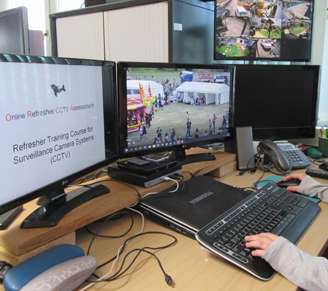Gordon Tyerman is bringing out ORCA – online refresher CCTV assessment. We took up Gordon’s offer of taking it ourselves at our desk.
The 45-second clip of video was from a single fixed camera at an outdoor summer fair, from 2018 (pictured, centre). Nothing and everything was happening, depending on your point of view. Adults and children were static, watching something under the camera, or dashing from one stall to the next. In the distance, a pair of policemen were walking leisurely from right to left – a good thing to spot, in case something did happen, some disorder or accident, and help had to be called for and directed to the scene. But there was no sign of anything amiss. No trouble brewing.
That didn’t stop Professional Security getting no more than four out of ten from the multi-choice questions that followed – and no second chance of viewing the video, to bump your score up, just as if there’s an incident, you can’t very well replay footage – that might only bring the risk of you missing some other detail in real time. The lesson, as Gordon Tyerman told Professional Security later, is that the operator has to pay attention.
It may similarly be in a shopping centre that ‘nothing happens’ – how then is the operator to stay interested, and motivated? It may be easier for the operator of a CCTV system in a busier town or city centre where more things, and more varied things, happen every shift. The operator, Gordon argue, has to be proactive; has to use experience of how trouble may be forming, if a crowd is gathering (or indeed dispersing). Equally, attention to detail matters, if an incident does happen and the operator has to alert police or ambulance to a suspect or victim. Hence the questions about the video clip – was the dad pushing a scooter or a bicycle for a girl? Did the man have a map of Africa or London on the front of his t-shirt?
One interesting thing that Professional Security found was that we guessed Africa correctly, though we had no more than a vague recollection of it – that detail must have stuck in the sub-conscious. Clearly to an extent you can rely on that sub-conscious – but only to a point; it’s no good letting an entire scene always wash over you. On a shift, let alone over a working life, you would lose all motivation and ability to react.
Gordon’s ORCA course taught and tested equally factual details, such as about the law – notably data protection, and health and safety in the control room, and (against voyeurism by operators) the Sexual Offenders Act 2003 – and scenarios. You’re a shopping centre CCTV operator, and you want to know what to include with a disc of evidence to go to police. Do you give your name and address, the name of the centre manager; which operators were on duty at the time of the incident recorded? The unique number of the disc? The fact that the operator did not see the offence on the disc – such as a cycle theft – first-hand?
The bulk of the course and testing on it were given over to CCTV procedures and operations. Say there’s a suspected case of vehicle theft on a disc of evidence for police – what five actions can you list, to ensure the integrity of that CD copy? Other scenarios spoke of the at the same time everyday and vital crimes and wrong-doing that the operator may see; youths in a corner of a park smoking something (do you take no notice, or call the police?). Or a group of young teens are in a park and one of them is acting in a sexualised way with a boy. Again, what things might you list that suggest a young person is at risk of harm?
It may be that the operator has to judge that one incident is more pressing and meriting of a police or council response than another – is traffic congestion or two cars bumping in a supermarket more important to respond to than a burst water pipe, a car park barrier broken, or collapsed scaffolding or two women pushing children in prams, trying to sell heather to increasingly irate shoppers?
The course also touches on operator well-being in the control room workplace – namely screen breaks, fire safety, and ways of dealing with work stress (more strong coffee, calming music or making sure you have plenty to eat through the day?).
While learning generally during lockdown, and presumably until a Covid-19 vaccine is general, has become virtual rather than in the physical classroom or library – and whether remote learning is the equal of face to face is arguable – it feels like such training for CCTV operators is well able to be carried out online, as it feels so much like the operator’s everyday surroundings.
More in the August 2020 print edition of Professional Security magazine. See also https://professionalsecurity.co.uk/news/training/orca-refresher/.
For more about ORCA visit https://cctvtraining.com/.










